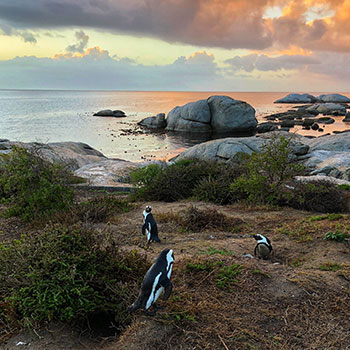Life on Land: Plants
Sciences & the Environment Program
Cape Town, South Africa
Dates: 7/8/22 - 11/16/22

Life on Land: Plants
OVERVIEW
CEA CAPA Partner Institution: University of Cape Town
Location: Cape Town, South Africa
Primary Subject Area: Biology
Instruction in: English
Course Code: BIO2012S
Transcript Source: Partner Institution
Course Details: Level 200
Recommended Semester Credits: 5
Prerequisites: BIO1000F or BIO1000H, BIO1004F/S
DESCRIPTION
Terrestrial plants inhabit a broad range of environments, that are distinguished by their abiotic (e.g. light, temperature, water, nutrients) and biotic (e.g. animals, plants, microbes) features. Adaptation to contrasting habitats has generated a diversity of form in plants, as well as a fascinating array of ecophysiological and ecological strategies. Starting with roots, stems and leaves, and finishing with reproductive structures (flowers and seeds) and life-histories, this course explores plant structure and function, and the manner in which this has changed through the course of evolutionary history. This is followed by an introduction to the diversity of vascular plants, with an emphasis on flowering plants, particularly those that typify the Cape flora. Finally, the biology of bryophytes (mosses and relatives) is considered, highlighting the very different solutions they employ for a life on land.
DP requirements: Minimum of 40% for class record and attendance at practicals and five-day field camp.
Assessment: A 3-hour examination written in November, with a subminimum of 40%, will count 50% of the course. Coursework marks will be allocated as follows: Practical classes (assessed weekly) count 20%, project based on field camp data collection counts 10%; two class tests count 20%.
The University of Cape Town awards credits based on the National Qualifications Framework (NQF) to determine course and contact hour recommendations per course. 1 NQF credit represents roughly 10 notional hours of work which includes study time, assignments and examinations. Notional hours may very per courses depending on the course level and modality therefore, CEA recommends using NQF credits as a basis to determine U.S. equivalencies (1 NQF=.222 semester credits)
DP requirements: Minimum of 40% for class record and attendance at practicals and five-day field camp.
Assessment: A 3-hour examination written in November, with a subminimum of 40%, will count 50% of the course. Coursework marks will be allocated as follows: Practical classes (assessed weekly) count 20%, project based on field camp data collection counts 10%; two class tests count 20%.
The University of Cape Town awards credits based on the National Qualifications Framework (NQF) to determine course and contact hour recommendations per course. 1 NQF credit represents roughly 10 notional hours of work which includes study time, assignments and examinations. Notional hours may very per courses depending on the course level and modality therefore, CEA recommends using NQF credits as a basis to determine U.S. equivalencies (1 NQF=.222 semester credits)







